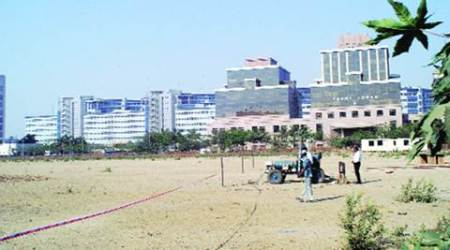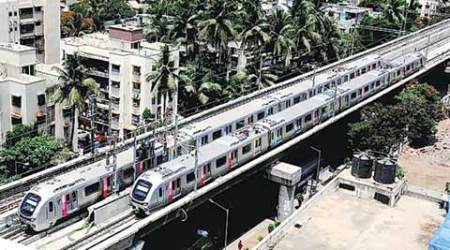 Mumbai Metropolitan Region Development Authority (MMRDA). (File Photo)
Mumbai Metropolitan Region Development Authority (MMRDA). (File Photo)
NEARLY four years after a building collapse in Bhiwandi claimed six lives, the Mumbai Metropolitan Region Development Authority (MMRDA) finds itself unable to demolish unauthorised constructions in the region. While poor coordination among various agencies stymies attempts at tackling rampant illegal construction in Bhiwandi, the planned demolition of unauthorised structures in the complex where the July 2013 tragedy took place is now one of the over 100 cases where demolition notices here have been stayed by courts.
According to a demolition notice issued by the MMRDA in April this year, at least 25 structures in Shree Arihant Complex, a sprawl of godowns, warehouses and commercial units in Bhiwandi, are illegal.
In an appeal against the notice, Arihant Corporation pleaded that demolition would cause ‘losses that cannot be compensated by money’, and a Bhiwandi magistrate’s court ordered that status quo be maintained. The case will be heard again this Wednesday.
The MMRDA, the Special Planning Authority (SPA) for the area, issued the demolition order on April 20 this year. According to the MMRDA, there are about 104 similar cases where there is a court-ordered status quo on cases of unauthorised construction.
After the alleged illegal constructions in Kalher village came to the fore following the July 2013 building collapse, seven persons, including the builders and developers of Arihant Corporation — Sanjay and Hasmukh Dodhia — were booked by the Narpoli police on charges of culpable homicide.
Also booked was Prem Punjabi, owner of a garment factory who had purchased shops on the first and second floor of the building that collapsed.
Punjabi’s agreement with Arihant included purchase of what he thought was “construction rights”, which meant he paid a portion of the shops’ agreed sale value directly to the civil contractor. “I took a loan for the purchase, and even the bank was under the impression that the builder had adequate rights and permissions in place,” Punjabi told The Indian Express.
Since being granted bail, Punjabi filed more than 50 Right to Information (RTI) applications in the Thane Collectorate and MMRDA.
Documents accessed by him revealed that despite having the nod for only 16 structures “of ground floor only” on the 13353-sq m plot, the number of buildings and their height violated all permissions.
Around 150 buildings stand on the plot, though MMRDA’s demolition notices are for around 25 structures whose illegality there is evidence of.
When contacted, Sanjay Dodhia of Arihant maintained that all buildings had requisite permissions.
“When we constructed the buildings in 2010 the MMRDA was not in the picture and we got the permissions from the authority concerned,” said Dodhia.
Asked about the practice of “selling FSI” instead of a built unit, Dodhia said purchasers sign contracts with the construction agencies or contractors. “This is a common practice in Bhiwandi. We can sell the FSI or the galas but we chose to sell FSI and let the purchaser build himself,” said Sanjay Dodhia.
“It is because we have the permissions that the court has stayed the demolition orders,” added Dodhia. Officials at the MMRDA, however, say the agency was appointed SPA for the region in April 2007, and their permissions were mandatory for construction in the area.
Metropolitan Commissioner UPS Madan said they would have to wait until the status quo order passed by the magistrate’s court in Bhiwandi is vacated. “But it takes many years for that,” Madan said.
A senior MMRDA official contended that cases pertaining to the Maharashtra Regional and Town Planning (MRTP) Act cannot be heard by magistrates’ courts, as jurisdiction over such cases rests with the Bombay High Court. Yet, he added,
“Whenever we sent notices for illegal construction the owner would go to the court with certificates from the Zilla Parishad or the Gram Panchayat and say that they have the permissions and the MMRDA is harassing them.”
Complicating matters further for those who purchased units in these properties is the MMRDA’s claim that the Zilla Parishad, the governing body until 2007, has not handed over all land-related documents to them.
Speaking on the lack of coordination between different government agencies, Madan said he asked the collector to hand over all the relevant documents to the MMRDA, but this is yet to be made available.
“The builders show us documents given by the Gram Panchayat and we have no way to check if they are genuine. If we take action, there are chances of being on the wrong side of the law. We have to send each case to the Panchayat to get confirmation and at times, even they don’t have complete records as they do not have a proper recording system,” Madan said.
With the number of such cases being granted a status quo on the rise, the MMRDA is now considering approaching the High Court, said the official.
On April 20, at the last hearing of the Arihant Complex case, Punjabi filed a plea to be made a party to the case. “By becoming a party to the case I want to prove my innocence,” he told The Indian Express.

